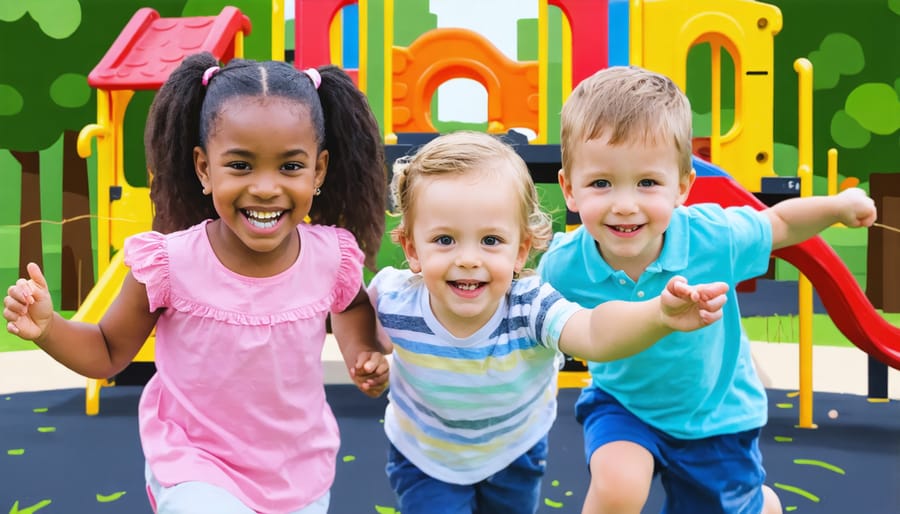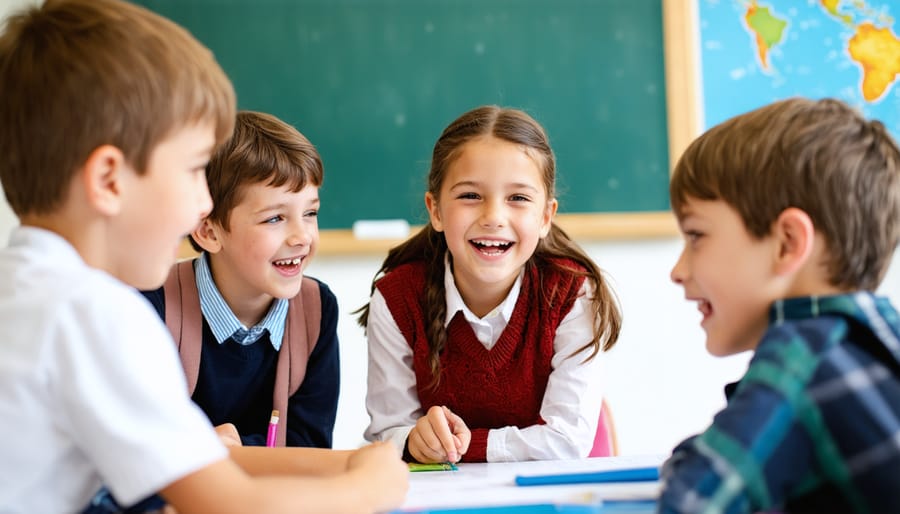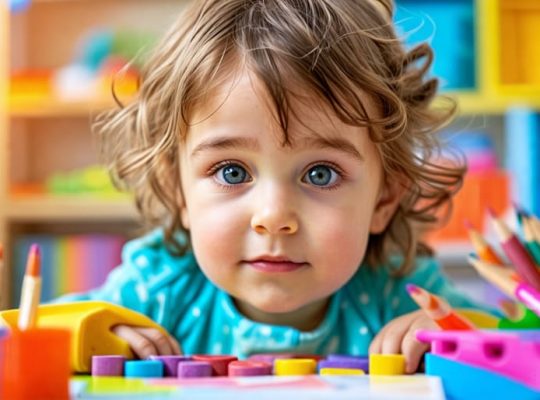Engage your middle schooler in open, supportive conversations about their friendships. Ask curious questions, validate their feelings, and remind them you’re always available to listen without judgment.
Model healthy relationship skills like active listening, compassion, and conflict resolution. Children learn by observing how you interact with friends, family, and colleagues.
Encourage involvement in structured activities aligned with their interests, like sports, arts, or volunteering. Shared passions foster organic social connections and a sense of belonging.
Teach respectful assertiveness, empowering them to set boundaries, voice needs, and navigate tricky social situations with confidence. Role-play scenarios to build and practice these essential skills.
The Landscape of Middle Childhood Friendships

Friendship Formation and Maintenance
In middle childhood, friendships become increasingly important as children seek out peers with shared interests, compatible personalities, and similar values. Proximity plays a significant role in friendship formation, with many children befriending classmates or neighbors. Social skills, such as cooperation, communication, and conflict resolution, are crucial for making and maintaining friends at this age.
Children with well-developed social skills are more likely to form positive friendships, while those struggling may experience challenges in connecting with peers. Factors such as empathy, emotional regulation, and the ability to read social cues contribute to successful friendship formation and maintenance.
Shared activities, such as sports, clubs, or hobbies, provide opportunities for children to bond over common interests and experiences. Through these shared experiences, children learn to support, encourage, and trust one another, fostering deeper connections.
Maintaining friendships requires ongoing effort and communication. Children learn to navigate conflicts, compromise, and show loyalty to their friends. They also develop a sense of reciprocity, understanding the importance of giving and receiving in their friendships.
Parents and caregivers can support their child’s friendship formation and maintenance by providing opportunities for social interaction, modeling positive social skills, and offering guidance when challenges arise. By nurturing these early friendships, children build a foundation for healthy relationships throughout their lives.
Gender Differences in Peer Relationships
During middle childhood, girls and boys often form friendships differently and engage in distinct social dynamics. Girls tend to have fewer, more intimate friendships focused on emotional sharing and cooperative play. Their friend groups are often smaller, with a “best friend” holding special importance. Girls are more likely to engage in conversation, imaginative play, and activities that foster closeness.
In contrast, boys typically have larger friend groups characterized by friendly competition and rough-and-tumble play. Their friendships tend to be based on shared interests and activities rather than emotional disclosure. Boys are more likely to jockey for social dominance within their peer groups and establish hierarchies.
Despite these general patterns, it’s crucial to recognize individual differences. Many children defy gender stereotypes in their social preferences. Some boys enjoy more intimate friendships, while some girls thrive on competition. As children progress through middle childhood, they may also increasingly socialize with opposite-gender peers.
Understanding these common differences can help parents and educators support each child’s unique social needs. Encouraging diverse friendships, fostering empathy, and providing opportunities for cooperative play can benefit all children. By nurturing individual strengths and promoting inclusive environments, we can help boys and girls build the social skills necessary for healthy relationships throughout life.

The Impact of Positive Peer Relationships
Social-Emotional Learning
Friendships play a crucial role in helping children develop essential social-emotional skills during middle childhood. Through positive peer interactions, kids learn empathy – the ability to understand and share the feelings of others. They practice putting themselves in their friends’ shoes, which fosters compassion and kindness. Cooperating with peers on projects, games, and activities teaches children the value of teamwork and how to work towards common goals. When conflicts arise, as they inevitably do, navigating disagreements with friends provides valuable opportunities to build conflict resolution skills. Children learn to express their emotions, listen to others’ perspectives, negotiate, compromise, and find solutions that work for everyone involved. Friendships also offer a safe space for kids to practice emotional regulation. Talking through challenges, sharing joys and sorrows, and supporting each other helps children learn to identify, express, and manage their own emotions in healthy ways. Positive friendships build self-awareness and self-control, buffering against stress and emotional difficulties. While parents can’t choose their children’s friends for them, they can model empathy, cooperation, peaceful problem-solving, and healthy emotion management in their own relationships. By nurturing their children’s social-emotional development, parents empower kids to form the supportive friendships that will help them thrive.
Academic Motivation and Success
Positive peer relationships play a crucial role in fostering children’s academic motivation and success during middle childhood. When children feel accepted and supported by their peers, they are more likely to engage actively in classroom activities, persist through challenges, and achieve better academic outcomes. Friendships provide a sense of belonging and emotional security that allows children to take risks, express their ideas, and collaborate effectively with others. Moreover, children with strong social connections tend to have higher self-esteem and confidence, which translates into greater resilience and adaptability in the face of academic setbacks. Peer relationships also offer valuable opportunities for children to learn and practice important skills, such as communication, problem-solving, and critical thinking, which are essential for success in school and beyond. By nurturing positive peer interactions and helping children navigate social challenges, parents and educators can create a supportive environment that fosters academic motivation, engagement, and achievement throughout the middle childhood years.
Mental Health and Resilience
During middle childhood, supportive friendships can serve as a powerful buffer against stress, anxiety, and depression. When children have friends they can rely on for emotional support, they feel more secure and better equipped to handle life’s challenges. Strong friendships provide a safe space for children to express their feelings, share their worries, and receive reassurance and encouragement.
Moreover, positive peer relationships can significantly boost a child’s self-esteem. When children feel accepted, valued, and appreciated by their friends, they develop a more positive self-image and greater confidence in their abilities. This enhanced self-esteem can help children navigate difficult situations and bounce back from setbacks more easily.
Friendships also offer valuable opportunities for children to develop essential coping skills. As they encounter conflicts or stressful situations with their peers, children learn how to communicate effectively, problem-solve, and regulate their emotions. They discover the importance of empathy, compromise, and forgiveness in maintaining healthy relationships. These skills not only benefit their friendships but also transfer to other areas of their lives, helping them build resilience and adaptability.
By fostering supportive friendships, parents and educators can play a crucial role in promoting children’s mental health and well-being during this critical developmental stage.
When Peer Relationships Struggle
Friendship Conflicts and Bullying
Disagreements and conflicts are a natural part of childhood friendships, but they can be challenging for kids to navigate on their own. As a parent, you can help your child develop healthy conflict resolution skills by encouraging open communication, empathy, and problem-solving. Teach your child to express their feelings calmly, listen to their friend’s perspective, and work together to find a solution that works for both of them.
Unfortunately, some conflicts can escalate into bullying, which can have serious consequences for a child’s mental health and well-being. If your child is being bullied, it’s essential to take it seriously and offer support. Encourage your child to stand up to bullying by using assertive communication, seeking help from trusted adults, and surrounding themselves with supportive friends.
It’s also important to teach your child when to seek adult intervention in conflicts or bullying situations. If your child feels unsafe, threatened, or unable to resolve a conflict on their own, encourage them to talk to you, a teacher, or another trusted adult. By providing a safe and supportive environment at home and teaching your child effective strategies to navigate disagreements and address bullying, you can help them build the skills and resilience needed to maintain healthy friendships throughout their lives.
Social Skills Deficits
As children navigate the complex world of peer relationships in middle childhood, some may struggle with social skills deficits that hinder their ability to form and maintain friendships. Parents and teachers can watch for signs that a child is having difficulty, such as reluctance to join group activities, trouble initiating interactions, misreading social cues, or frequently experiencing conflict with peers. When these challenges arise, it’s essential to provide compassionate support and guidance to help the child develop key social skills.
Coaching can focus on practicing conversation starters, active listening, taking turns, and reading nonverbal cues like facial expressions and body language. Role-playing and discussing hypothetical social scenarios can help children practice these skills in a safe environment. Emphasizing empathy, kindness, and being a good friend can also encourage positive social behaviors. With patience, understanding, and targeted support, children with social skills deficits can learn to navigate the intricacies of peer relationships more effectively, setting the stage for healthier social connections throughout their lives.
Parents play a crucial role in supporting their children’s peer relationships during middle childhood. By providing ample social opportunities, such as playdates, extracurricular activities, and family gatherings, parents can help their children practice social skills and build friendships. Coaching children on essential friendship skills, like effective communication, empathy, conflict resolution, and emotional regulation, can equip them with the tools they need to navigate the complexities of peer relationships. Modeling positive values, such as kindness, respect, and inclusivity, sets a strong foundation for children to develop healthy friendships based on mutual trust and support. Perhaps most importantly, offering a safe, nurturing home environment where children feel loved and validated can provide a secure base from which they can explore and grow in their social world. By being emotionally available, actively listening to their children’s concerns, and providing guidance and encouragement when needed, parents can help their children build resilience and confidence in their ability to form and maintain meaningful friendships. As children navigate the joys and challenges of peer relationships during this pivotal stage of development, the unwavering support and involvement of parents can make all the difference in helping them thrive socially and emotionally.







